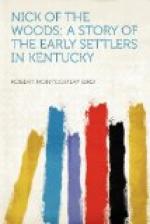As he lay upon the ground, his cheek pillowed upon it stone which accident, or perhaps the humanity of the old warrior, had placed under his head, he could distinguish a hollow, pattering, distant sound, in which, at first mistaken for the murmuring of the river over some rocky ledge, and then for the clatter of wild beasts approaching over the rocky hill, his practised ear soon detected the trampling of a body of horse, evidently winding their way along the stony road which had conducted him to captivity, and from which he was but a few paces removed. His heart thrilled within him. Was it, could it be, a band of gallant Kentuckians, in pursuit of the bold marauders, whose presence in the neighbourhood of the settlements had been already made known? or could they be (the thrill of expectation grew to transport, as he thought it) his fellow emigrants, summoned by the faithful Nathan to his assistance, and now straining every nerve to overtake the savages, whom they had tracked from the deserted ruin? He could now account for the disappearance of his captors, and the deathlike silence that surrounded him. Too vigilant to be taken at unawares, and perhaps long since apprised of the coming of the band, the Indians had resumed their hiding-places in the grass and among the bushes, preparing for the new-comers an ambuscade similar to that they had so successfully practised against Roland’s unfortunate party. “Let them hide as they will, detestable miscreants,” he uttered to himself with feelings of vindictive triumph; “they will not, this time, have frightened women and a handful of dispirited fugitives to deal with.”
With these feelings burning in his bosom, he made an effort to turn his face towards the top of the hill, that he might catch the first sight of the friendly band, and glut his eyes with the view of the anticipated speedy discomfiture and destruction of his enemies. In this effort he received unexpected aid from the old warrior, who, perceiving his intention, pulled him round with his own hands, telling him, with the grim complacency of one who desired a witness to his bravery, “Now, you hold still, you see,—you see Piankeshaw old Injun,—you see Piankeshaw kill man, take scalp, kill all Long-knife:—debbil great fighting-man, old Piankeshaw!” which self-admiring assurance, repeated for the third time, the warrior pronounced with extreme earnestness and emphasis.




